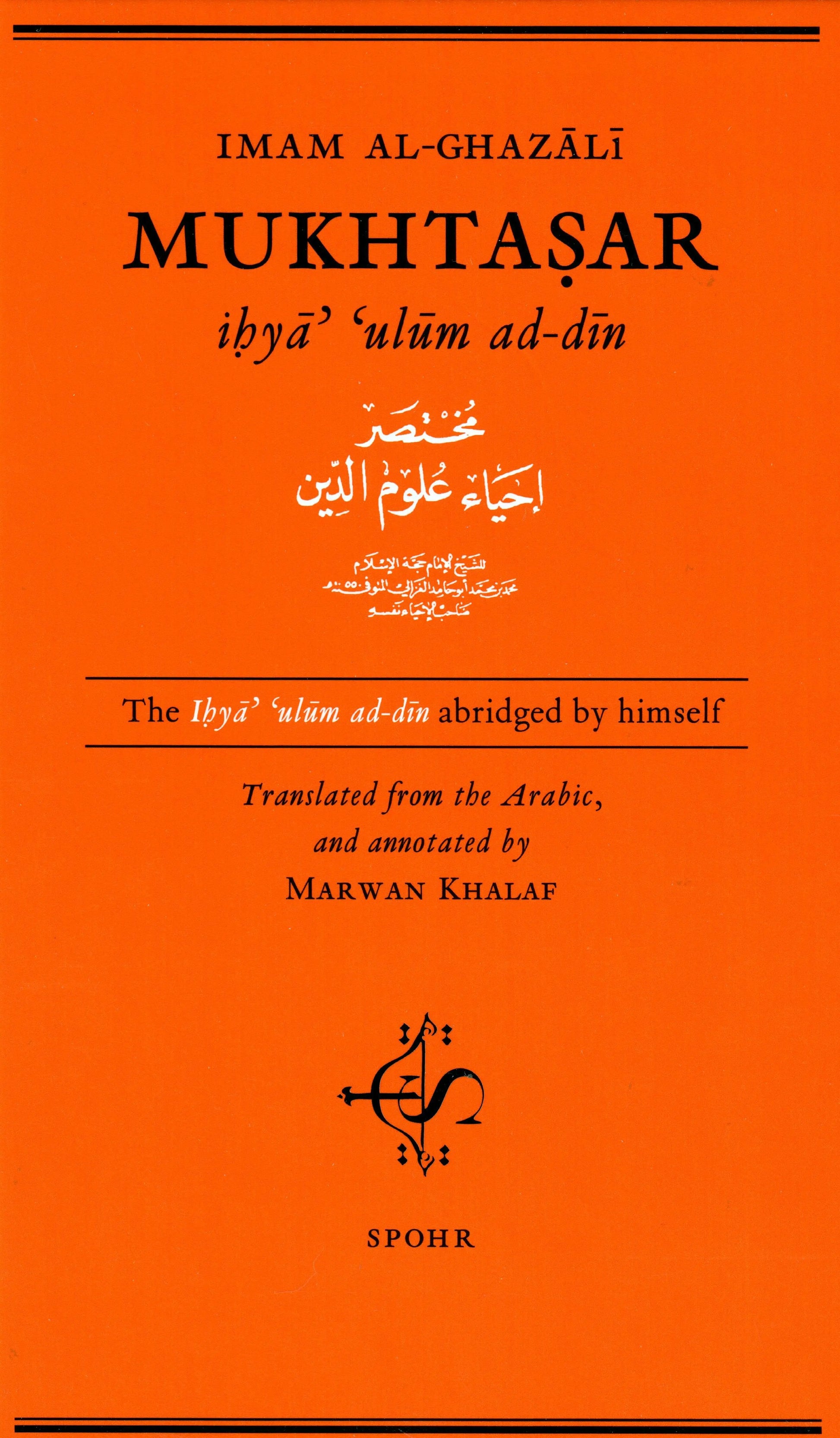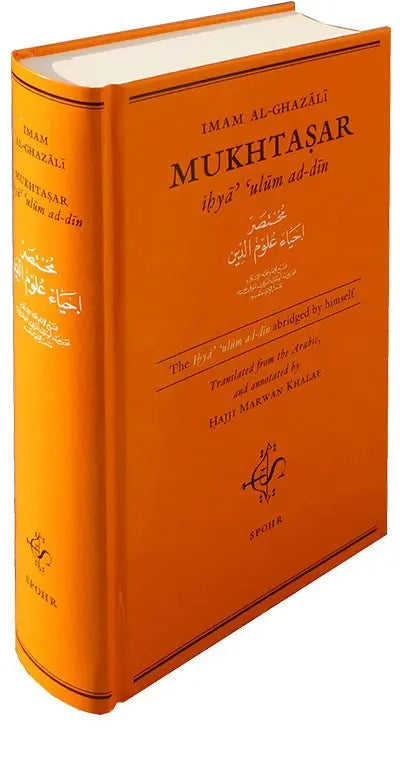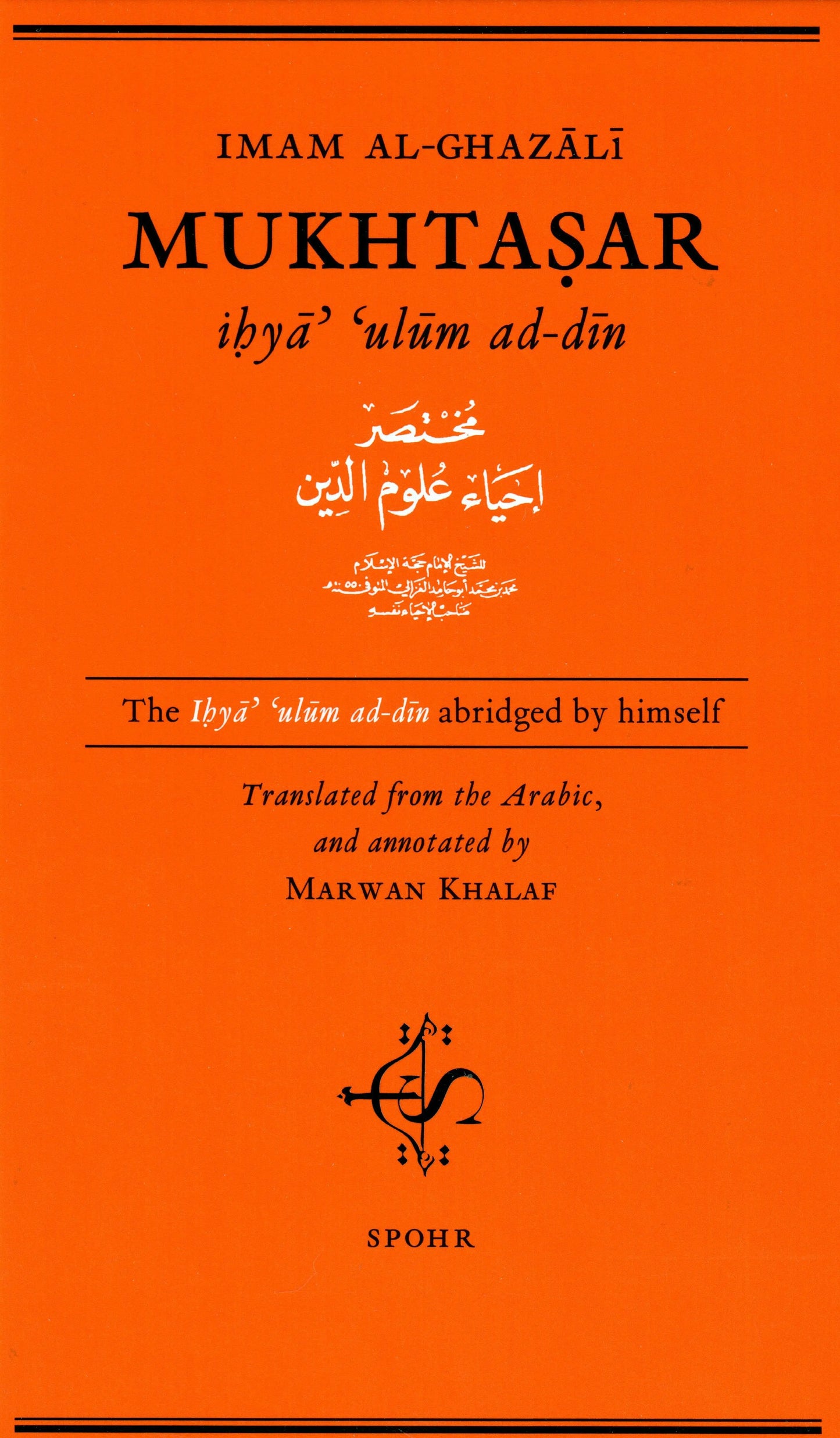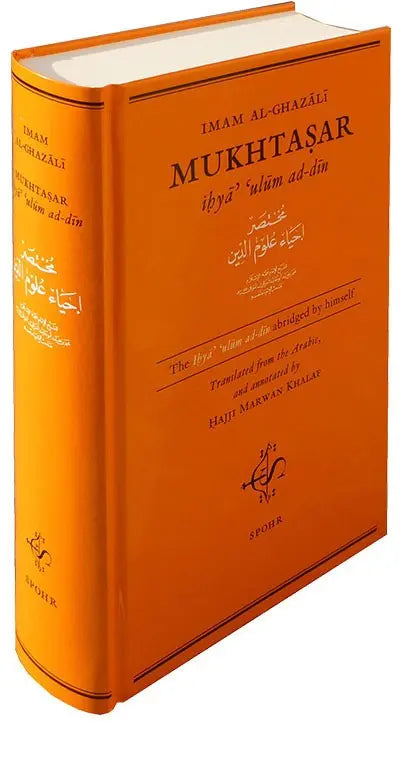Publishers Preface :
By the publication of this book entitled Mukhtasar, we aim to acquaint an English-speaking readership with the abridged version of Muhammad ibn Muhammad Abû Hâmid al-Ghazâlî’s magnum opus, the Ihya’ ‘ulûm ad-dîn, ‘The Revival of the Religious Sciences’, which has been regarded as one of the most important writings of the Islamic tradition for nine hundred years and is esteemed and appreciated among Muslims worldwide like no other work.
According to the written records available to us today, the Master himself invested a great deal of energy in the preparation of this concise version to produce a volume that would enable him (cf. p. 23) to take his work along on his journeys.
Whereas in the full-length version of his work, the author’s knowledge and wisdom unfolds over the course of forty books, we here have only forty chapters; in these everything concerning human life from the cradle to the grave is discussed with refreshing brevity and unambiguous lucidity. The book opens with a fundamental discussion of questions of knowledge and faith which makes up its first quarter; its second quarter is devoted to questions of everyday life, such as the proper conduct in marriage and the like; this is followed in the third section by an exceedingly subtle description of the intricacies of the inner workings of the human soul and the ‘miracle of the heart’, and the fourth part delineates the paths to salvation, and reaches its climactic conclusion in the last chapter ‘Remembrance of Death and the Afterlife’.
Throughout the book, topics are raised that are of interest not just to the religious-minded, but to mankind in general. The chapter on ‘Intention, Sincerity and Truthfulness’
(an-niyyah wa l-ikhlas wa s-sidq) for instance, focuses on the fundamental questions which turn an action into a good deed that brings its agent honour and helps us become true human beings. It might well come as the greatest surprise to one who has been brought up and taught in the Western tradition, that about one-thousand years before the German philosopher Immanuel Kant by his concept of ‘good will’ identified the intention
as the main criterion for the morality of an action, Sayyidina Muhammad, may Allah bless him and grant him peace, the Prophet of Islam, had already proclaimed to humanity this all-important principle for every action and (intentional) non-action.
With this book, Imam Ghazâlî consolidated the legacy left by the Holy Prophet into a form that makes it indispensable reading for every Muslim, as well as for those inspired by the
fundamental questions of our existence; the text also incites and encourages the yearning for those means whereby we might attain happiness in this life and the hereafter.
We are pleased to make this famous scholar’s dogmatically precise and intellectually profound masterpiece, which in a unique way taps into the sources while simultaneously conserving them, accessible in such a convenient form, a shining star in the firmament of mankind’s literary heritage.---Salim E. Spohr.
Table of Contents :
---Publisher’s Preface,
---Acknowledgements,
---Translator’s Preface.
The Mukhtasar :
---First Quarter - On Worship (al-‘Ibâdât),
Chapter's 1-10,
---[1] On Knowledge and Imparting Knowledge,
---[2] On Doctrine (i'tiqad)
---[3] On the Secrets of Purity,
---[4] On the Mysteries and Functions of Prayer,
---[5] On the Mysteries of the Alms Tax, (Zakah),
---[6] On the Secrets of Fasting,
---[7] On the Mysteries of Pilgrimage, and related matters,
---[8] On the Recitation of the Qur'an,
---[9] On Remembrances (dhikr) and Supplications,
---[10] The litanies or Remembrance (awrad).
---Endnotes.
---Second Quarter - On The Practices (al-‘Adât),
Chapter's 11-20,
---[1] On Manners related to Eating and Drinking,
---[2] On the Etiquette of Marriage,
---[3] On the Manners related to Earning and Livelihood,
---[4] On the Lawful and the Unlawful, (halal and haram),
---[5] On the Ethics of Companionship,
---[6] On Seclusion,
---[7] On Travel,
---[8] On listening to music or song and ecstasy,
---[9] On enjoining what is right and forbidding what is wrong,
---[10] On the etiquette of living and the ethics of Prophethood.
---Endnotes.
---Third Quarter - On The Mortal Vices (al-Muhlikât)
Chapter's 21-30,
---[1] On the Miracles of the Heart,
---[2] On Disciplining the Soul (the nafs),
---[3] On Breaking the Two Desires,
---[4] On the evils of the Tongue,
---[5] On the evils of Anger, Malice and Envy,
---[6] On the deprecation of the World,
---[7] Exposition on the criticism of the love of wealth & the criticism of miserliness,
---[8] On the deprecation of fame and hypocrasy (showmanship),
---[9] On criticism of Arrogance and Pride,
---[10] On the depracation of Vainglory, (ostentation).
---Endnotes.
---Fourth Quarter - On The Saving Virtues (al-Munjiyât)
Chapter's 31-40.
---[1] On Repentance,
---[2] On Steadfastness and Thanksgiving,
---[3] On Hope and Fear,
---[4] On Poverty and Asceticism
---[5] On the Unity of God and Reliance on Him,
---[6] On Love, Yearning and Contentment,
---[7] On Resolve, Sincerity and Truthfulness,
---[8] On Vigilance and Self-Examination,
---[9] On Meditation,
---[10] On the Remembrance of Death & what is after It.
---Endnotes.
---Bibliography,
---About Imâm al-Ghazâlî.
About The Author
Imam Abu Hamid Muhammad Al-Ghazali was born in 450 AH (1058 A.D) in the Iranian town of Tus, studied Islamic law and theology at the Seljuq College in Nishapur, and became a distinguished professor at the famous Nizamiyya University in Baghdad.
Despite his glittering success, he was inwardly dissatisfied, so he abandoned his career for the life of hardship, abstinence and devotion to worship. During ten years of wandering, he experienced a spiritual transformation, in which the Truth came to him at last, as something received rather than acquired.
Blessed with an inner certainty, he then applied his outstanding faculties and vast learning to the task of revitalizing the whole Islamic tradition. Through his direct personal contacts, and through his many writings, he showed how every element in that tradition could and should be turned to its true purpose.
Imam al-Ghazzali was fondly referred to as the "Hujjat-ul-lslam", Proof of Islam, he is honoured as a scholar and a saint by learned men all over the world and is generally acclaimed as the most influential thinker of the Classical period of Islam.
He passed away in 505 AH (1111 A.D).






